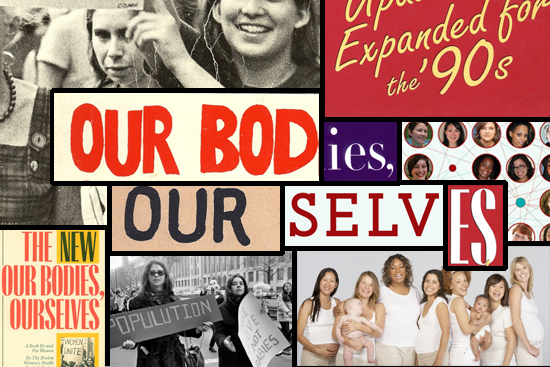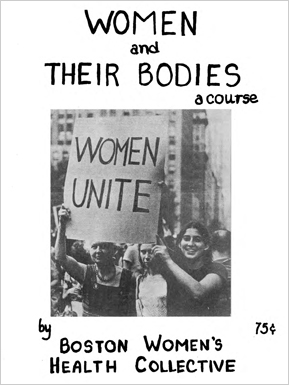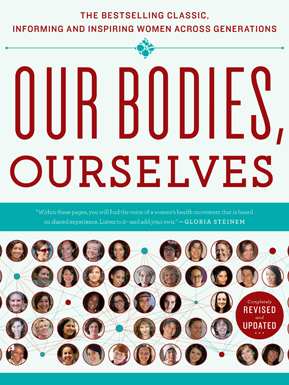Our Bodies, Ourselves Celebrates 40 Years
Global symposium at BU honors women’s health pioneers

The pioneering Our Bodies, Ourselves book series, celebrating its 40th anniversary, has sold 4.5 million copies. Graphic by Joe Chan
In the beginning was the book.
Most college women today are probably unaware that they owe their access to specialized women’s health care, the abundance of frank information about their bodies and their sexuality, and the ever-swelling tide of wellness literature in large part to a now-iconic paperback titled Our Bodies, Ourselves.
Recently named by Time magazine one of the 100 best and most influential books written in English since 1923, the 1971 pioneer of the self-help genre was conceived two years earlier by 12 women attending a “women and their bodies” workshop at a women’s liberation conference at Boston’s Emmanuel College.
Four decades and nine editions later, the University is hosting a symposium, tomorrow, October 1, to celebrate the Our Bodies Ourselves (OBOS) Global Initiative. The symposium, Our Bodies, Our Future: Advancing Health and Human Rights for Women and Girls, brings together women’s health activists from 12 nations to join directors and founders, past and present, of the Boston Women’s Health Book Collective, also referred to as Our Bodies Ourselves, which produced the original and revised Our Bodies books as well as spinoffs on pregnancy and menopause. Also tomorrow, Simon & Schuster will release the ninth edition of the book.
“It was revolutionary,” says Leonard Glantz, a School of Public Health professor of health law, bioethics, and human rights, of the original Our Bodies, Ourselves. When first published, the book was the size of a suburban phone book and bore a now-famous cover depicting women of three generations hoisting a WOMEN UNITE placard. Lisa Messersmith, an SPH associate professor of international health, was a teenager at the time. She recalls thinking that she’d “never seen anything” remotely like the explicitly illustrated collection of chapters that candidly, and without any judgment, dealt with issues from birth control to venereal disease to masturbation. Initially banned from many major bookstores, Our Bodies spread quickly long before the Internet, its word-of-mouth promotion ensuring that copies of the book were as much a fixture in dorm rooms as Kahlil Gibran’s The Prophet and hot pots. Since then, the Our Bodies series has sold around 4.5 million copies.

“It went viral because it filled such a gigantic need,” says Glantz, who has worked with OBOS on legal issues over the years. “Women would look at this book and say, ‘Oh my God, these are my questions,’ things nobody talked about. It let women know there’s a way to get comfortable with their bodies, with explicit pictures. It went after myths about women at a time right after the days reflected in the AMC series Mad Men, with Playboy bunnies and guys pinching their secretaries. I hate using the word unique, but it really was unique.”
Today, the thriving, Cambridge-based Boston Women’s Health Book Collective has a far-reaching, progressive agenda, including its Latina Health Initiative, a global translation program that works with indigenous women’s groups on OBOS adaptations in African and South Asian dialects, and maintaining its profile as a women’s rights advocate on issues ranging from drug advertising to the clinical applications of genetics.
Judy Norsigian (Hon.’07), the current executive director of Our Bodies Ourselves, was, at 23, the youngest of the founders who produced the 193-page course booklet Women and Their Bodies, the scrappy precursor to the book. They changed the title to put an emphasis on women taking full ownership of their bodies, something the health collective vigorously advocates for in the United States and overseas, says Norsigian, who continues to make waves during what she sees as a time of puritanical backlash.
“It was clear in the mid-’70s, after the book became a best seller, that it was meeting a desperate need, and that ignorance is certainly not bliss,” says epidemiologist Deborah Maine, an SPH professor of international health, who has been working on women’s reproductive health in developing countries for 30 years. She calls the first Our Bodies, Ourselves an amazing breakthrough. “Now we talk all the time about how information is power, and about patients’ rights, how you should make a list of questions to ask your doctor, but this book was before all that, and it was groundbreaking,” she says. “It’s frustrating how college women take these gains for granted, but, in another way, why should they understand what it was like then?”
Despite a torrent of imitators and spinoffs, Our Bodies, Ourselves has always had a broader mission than making women more aware of physical health and wellness. “The book isn’t just about facts and figures, but about political and social conflict” and educating women about “the political, social, and economic factors that create obstacles to staying well,” says Norsigian, who stresses that while women’s health information is now ubiquitous on the Internet, much of that information has a commercial agenda. The collective has never accepted funding from pharmaceutical companies. Since its establishment, there has been no shortage of targets for the collective’s efforts; OBOS has lately focused its domestic efforts on health care reform and the need for affordable health care.
By honoring OBOS’s global partners, tomorrow’s symposium reflects “what we’re celebrating most—the way the book has traversed the globe and become an extraordinary resource,” Norsigian says. She and fellow founders and OBOS directors, including many BU alumni, will be joined at the symposium, subtitled Advancing Health and Human Rights for Women and Girls, by women’s groups from Armenia, Senegal, Turkey, India, Japan, Tanzania, Israel, Nigeria, Serbia, Bulgaria, Nepal, and Latin America.

First published by New England Free Press and costing 75 cents, Our Bodies, Ourselves was released in its first commercial edition by Simon & Schuster. Women from their teens on devoured it, discussed it, and passed it along to their friends, mothers, and daughters. In addition to Our Bodies, Ourselves editions in many languages, including Spanish, French, Polish, most recently, Nepali and Turkish, and Pregnancy and Birth (2008), and Menopause (2006) editions, the book has been continuously expanded from its original 170 pages to its newest edition, at a hefty 928 pages.
The new edition is weighted toward self-care and information about body image, sexuality, safer sex, and relationships, says senior editor Kiki Zeldes. “We wanted to bring some more life into our relationship and sexuality chapters, so we put out a call in our blog, and chose 37 women, ages 18 to 63, straight, lesbian, bi, poly, and posed some basic questions about love, sex, power differences, violence, all kinds of things, and people were incredibly heartfelt and honest,” says Zeldes. “It’s such a confessional culture, but we realized that it’s still difficult and rare for women to speak about complexities and contradictions in our sexual lives. We wanted to go back to the early books, the way those chapters were written by groups of women sitting around some living room in Cambridge.”
Today, versions of that living room are sprouting in the villages of developing countries, says Lois McCloskey, an SPH associate professor of community health sciences, who notes that the “long tentacles” of OBOS are reaching into communities in rural Africa and China, far from information channels and empowerment movements. McCloskey used the book when she taught women’s health policy-making, “but it wasn’t so much the book itself” that had an impact on students, it was “teaching young people about the incredible and profound influence of that organization on the first wave of the women’s health movement,” she says. “It teaches how a few can make a pronounced and sustained difference.”
Our Bodies, Our Future: Advancing Health and Human Rights for Women and Girls is being held at the Tsai Performance Center tomorrow, Saturday, October 1, from 9 a.m. to 5 p.m. The symposium is sold out, but you can watch streaming live video of the entire symposium here between 9 and 5 tomorrow. A schedule of the day’s events is available here.
Comments & Discussion
Boston University moderates comments to facilitate an informed, substantive, civil conversation. Abusive, profane, self-promotional, misleading, incoherent or off-topic comments will be rejected. Moderators are staffed during regular business hours (EST) and can only accept comments written in English. Statistics or facts must include a citation or a link to the citation.